Best SaaS Customer Support Software to Try Now
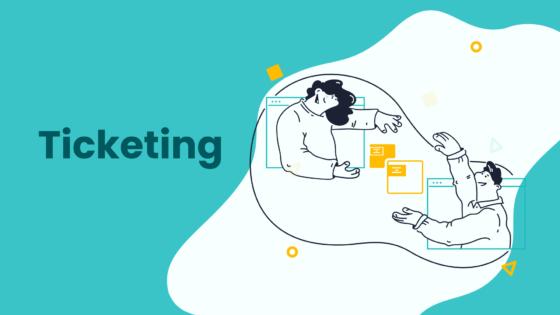
In today's fast-paced business world, delivering exceptional customer support is no longer optional. SaaS customer support software plays a pivotal role in helping businesses meet customer expectations while streamlining operations. For instance, tracking metrics like the number of customer engagements and average speed to answer ensures your team stays efficient and responsive. Tools like these also improve customer satisfaction scores by reducing response times and enhancing service quality. With solutions like Sobot, you can unify communication channels, automate workflows, and provide seamless support experiences. Explore the best options available to elevate your customer support strategy in 2025.
What Is SaaS Customer Support Software?
Definition and Overview
SaaS customer support software refers to cloud-based platforms designed to help businesses manage customer interactions efficiently. These tools operate entirely online, eliminating the need for complex installations or hardware. You can access them from anywhere with an internet connection, making them highly flexible. SaaS help desk software centralizes customer communication, allowing your team to handle inquiries, complaints, and feedback from multiple channels in one place. This unified approach ensures faster responses and better organization.
Key Benefits for Businesses
Using SaaS help desk software offers several advantages that can transform your customer service operations. Here are some key benefits:
- Improved Customer Satisfaction (CSAT): Faster response times and personalized service lead to happier customers.
- Higher Customer Retention Rate (CRR): Satisfied customers are more likely to stay loyal to your brand.
- Reduced Churn Rate: By addressing issues promptly, you can prevent customers from leaving.
- Enhanced Revenue Forecasting: Metrics like Monthly Recurring Revenue (MRR) help you plan budgets effectively.
- Streamlined Help Desk Management: Automation features reduce manual tasks, boosting team productivity.
These benefits make SaaS help desk software a valuable asset for businesses aiming to improve customer experience and operational efficiency.
Why SaaS Is the Preferred Model for Customer Support
SaaS help desk software stands out because of its accessibility, scalability, and cost-effectiveness. Unlike traditional systems, these cloud-based platforms require no upfront investment in hardware. You only pay for what you use, making them budget-friendly. They also scale effortlessly as your business grows, ensuring you can handle increasing customer demands. Additionally, features like live chat support and omnichannel support allow you to provide seamless customer experiences across various platforms. With SaaS, you can focus on delivering exceptional customer support without worrying about technical complexities.
Top SaaS Customer Support Software for 2025
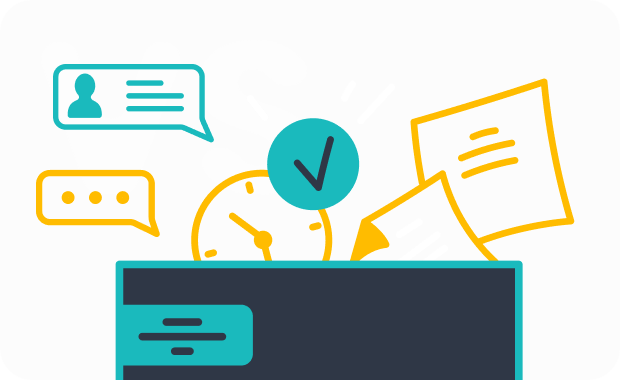
Zendesk
Zendesk remains a top choice for businesses seeking reliable saas help desk solutions. Known for its user-friendly interface, it simplifies customer support by centralizing all interactions in one place. Zendesk offers features like ticketing, live chat, and knowledge base management, making it versatile for businesses of all sizes. Its scalability ensures that as your business grows, Zendesk can adapt to your needs.
Zendesk's performance is validated by its strong market presence. According to recent data, Zendesk holds a medium market share but leads in spend share, reflecting its popularity among businesses willing to invest in the best help desk software.
| Rank | Company | Market Share | Spend Share |
|---|---|---|---|
| 2 | Zendesk | Medium | High |
Freshdesk
Freshdesk is another excellent saas help desk software that caters to businesses looking for affordability without compromising on features. It provides tools like ticketing, automation, and multi-channel support, ensuring seamless customer interactions. Freshdesk's gamification feature motivates support teams by turning tasks into challenges, boosting productivity.
This platform is particularly suitable for small to mid-sized businesses. Its intuitive design and cost-effective pricing make it one of the best help desk software options for startups and growing companies.
HubSpot Service Hub
HubSpot Service Hub combines customer support with CRM capabilities, offering a comprehensive solution for businesses. This saas help desk software integrates seamlessly with HubSpot's marketing and sales tools, providing a unified platform for managing customer relationships. Features like ticket pipelines, customer feedback surveys, and reporting dashboards help you deliver exceptional service.
HubSpot Service Hub is ideal for businesses aiming to align their support, sales, and marketing efforts. Its robust analytics and automation tools make it a powerful choice for scaling operations.
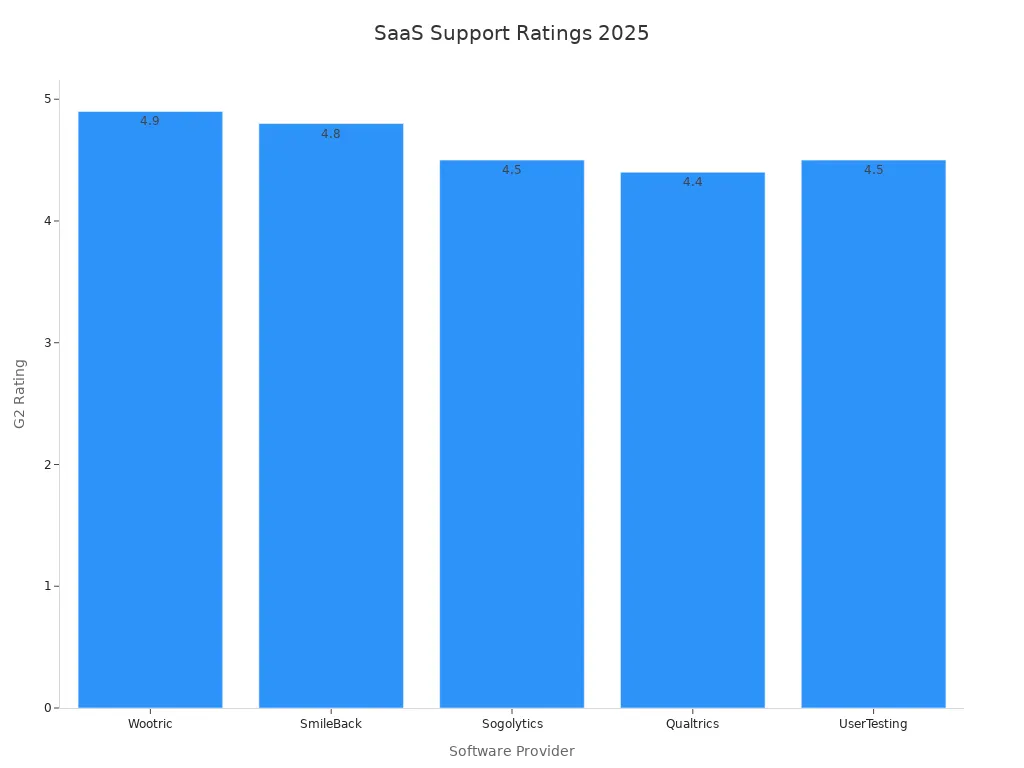
Zoho Desk
Zoho Desk is a robust saas help desk solution designed to simplify customer support operations. It offers a user-friendly interface that allows you to manage tickets, automate workflows, and track performance metrics. This help desk software integrates seamlessly with other Zoho products, making it an excellent choice if you already use their ecosystem. Features like AI-powered ticket tagging and sentiment analysis help you prioritize tasks effectively.
Zoho Desk supports multi-channel communication, enabling you to handle customer inquiries from email, chat, and social media in one place. Its self-service portal empowers customers to find answers independently, reducing the workload on your support team. Businesses of all sizes can benefit from its scalability and affordability.
Intercom
Intercom is another popular saas help desk software that focuses on conversational support. It combines live chat, bots, and email to create a unified customer experience. Intercom's standout feature is its proactive messaging, which allows you to engage customers before they even ask for help. This approach can improve customer satisfaction and retention.
The platform also provides detailed analytics, helping you understand customer behavior and optimize your support strategy. Intercom is particularly suitable for businesses that prioritize real-time communication. However, its pricing may be a consideration for smaller companies.
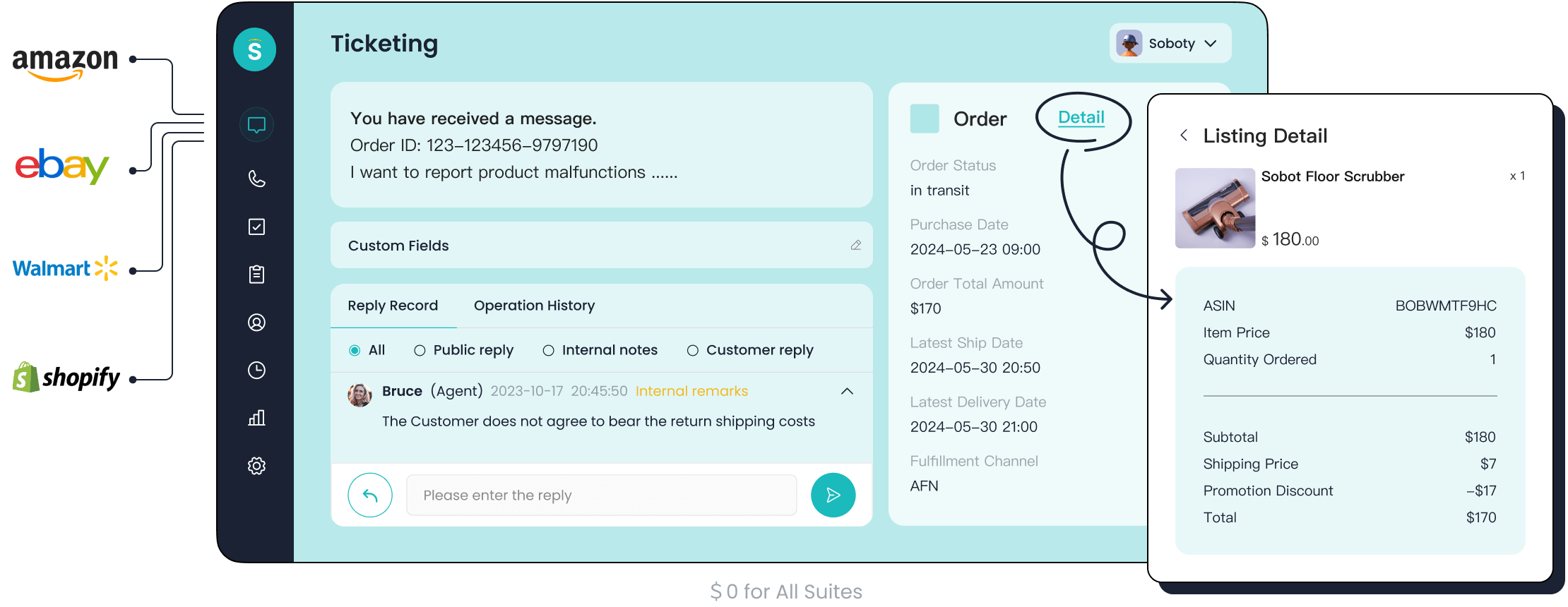
Sobot Ticketing System
The Sobot Ticketing System stands out as one of the best help desk software options for businesses aiming to streamline their customer support. This saas help desk solution offers a unified platform to manage all communication channels, including email, voicemail, and chat. Its automation features, such as custom trigger rules and SLA management, reduce manual effort and enhance efficiency.
Sobot's multilingual support ensures you can cater to a global audience, while its trusted analytics provide valuable insights into team performance. For example, Samsung achieved a 30% increase in agent efficiency after implementing Sobot's solutions. The system's seamless integration with platforms like Shopify makes it ideal for e-commerce businesses.
With Sobot, you can improve customer satisfaction and operational efficiency, making it a valuable asset for businesses of all sizes.
Learn more about Sobot Ticketing System.
LiveAgent
LiveAgent is a powerful saas help desk solution designed to simplify customer support. It provides a unified platform where you can manage all customer interactions. This tool supports multiple channels, including email, live chat, and social media, ensuring you never miss a customer query. Its real-time live chat feature stands out, allowing you to engage with customers instantly.
One of LiveAgent's key strengths is its ticketing system. It organizes all customer inquiries into a single dashboard, making it easier for your team to prioritize and resolve issues. You can also automate repetitive tasks, saving time and improving efficiency. Features like canned responses and ticket merging further streamline your workflow.
LiveAgent offers robust analytics to help you monitor performance. You can track metrics like response times and customer satisfaction scores. These insights enable you to identify areas for improvement and optimize your support strategy.
Tip: LiveAgent's gamification feature can motivate your team by turning tasks into challenges. This approach boosts productivity and keeps your team engaged.
This saas help desk software is ideal for businesses of all sizes. Its scalability ensures it grows with your needs, making it one of the best help desk software options available.
Help Scout
Help Scout focuses on delivering personalized customer support. This saas help desk software is perfect for businesses that value human connections. It offers a shared inbox where your team can collaborate on customer inquiries. This feature ensures no question goes unanswered.
Help Scout's knowledge base feature allows you to create self-service options for your customers. They can find answers to common questions without contacting your team. This reduces the workload on your agents and improves customer satisfaction.
The platform also provides detailed reporting tools. You can analyze customer interactions and measure team performance. These insights help you make data-driven decisions to enhance your support operations.
Help Scout integrates seamlessly with other tools, such as CRMs and e-commerce platforms. This makes it a versatile choice for businesses looking to unify their systems. Its user-friendly interface ensures your team can start using it with minimal training.
With Help Scout, you can provide exceptional customer support while maintaining a personal touch. This makes it one of the best help desk software options for businesses that prioritize customer relationships.
Features, Pricing, and Use Cases of Each Software
Key Features to Look For
When choosing SaaS customer support software, focus on features that enhance efficiency and customer satisfaction. Look for self-service portals that empower customers to resolve issues independently. These portals reduce the workload on your team and improve response times. AI-powered automation is another essential feature. It streamlines repetitive tasks like ticket routing and prioritization, allowing your team to focus on complex issues. Real-time analytics provides actionable insights into performance metrics, helping you optimize your support strategy.
Centralized knowledge bases prevent duplication of information and ensure consistent responses. Integration capabilities with platforms like Shopify or Salesforce enable seamless workflows. These features collectively improve productivity and customer experience.
Pricing Models and Plans
SaaS help desk software offers various pricing models to suit different business needs. Here's a comparison of popular providers:
| Provider | Plan | Price |
|---|---|---|
| HubSpot | Starter | $30/mo |
| HubSpot | Professional | $490/mo |
| HubSpot | Enterprise | $1,180/mo |
| Intercom | Essentials | $29/seat/month |
| Intercom | Advanced | $85/seat/month |
| Intercom | Expert | $132/seat/month |
| Jitbit | Freelancer | $29/mo |
| Jitbit | Startup | $69/mo |
| Jitbit | Company | $129/mo |
| Jitbit | Enterprise | $249/mo |
Agent-based pricing models are common, where costs scale with the number of users. Some providers also offer team-based or unlimited agent plans for larger organizations. Evaluate your budget and team size to choose the best option.
Best Use Cases for Different Business Sizes and Industries
SaaS customer support software caters to businesses of all sizes and industries. For small businesses, self-service portals and centralized knowledge bases provide cost-effective solutions. These tools reduce the need for large support teams while maintaining high service quality. Mid-sized companies benefit from AI-powered automation, which manages high ticket volumes and prioritizes urgent requests.
Large enterprises often require real-time analytics to monitor performance across multiple teams. Industries like e-commerce and retail rely on integration capabilities to connect with platforms like Shopify. Financial services and gaming industries use automation to handle technical issues efficiently. Social proof, such as Samsung's 97% customer satisfaction rate after implementing Sobot, highlights the effectiveness of these solutions.
Tip: Choose software that aligns with your industry-specific challenges and scales with your business growth.
How to Choose the Right SaaS Help Desk Software
Assessing Your Business Needs
Start by identifying your business's unique requirements. Consider the volume of customer inquiries, the complexity of your workflows, and the channels your customers prefer. For example, if your team handles high ticket volumes, automation features like ticket routing and SLA management can save time. If your customers interact across multiple platforms, omnichannel support ensures seamless communication.
Use a structured approach to evaluate software options. Here's a table to guide you:
| Criteria | Description |
|---|---|
| Data Security Measures | Evaluate encryption methods, compliance with regulations, and security audits to protect sensitive information. |
| Customer Support | Assess availability, responsiveness, support channels, and training resources to ensure effective user assistance. |
| Reliability and Uptime | Check reliability testing protocols and historical uptime rates to ensure continuous operation of the software. |
| Reporting and Analytics | Look for capabilities that allow real-time data access, analysis, and visualization to support informed decision-making. |
This framework helps you align software features with your operational goals.
Evaluating Scalability and Integrations
Scalability is critical for growing businesses. A scalable solution ensures your software can handle increased ticket volumes and additional users as your company expands. Statistics show that 60% of high-growth companies utilize help desk systems, highlighting the importance of scalability in driving business success.
Integrations also play a vital role. Choose software that connects seamlessly with your existing tools, such as CRMs or e-commerce platforms. For instance, integrating with Shopify can streamline order-related inquiries, while Salesforce integration enhances customer data management. These integrations reduce manual work and improve efficiency.
Considering Budget and ROI
Budget constraints often influence software decisions. Compare pricing models to find one that fits your financial plan. Agent-based pricing works well for small teams, while unlimited agent plans suit larger organizations.
Focus on return on investment (ROI) rather than just upfront costs. A solution that automates workflows and improves customer satisfaction can save money in the long run. For example, reducing churn rates and increasing customer retention directly impact revenue. Prioritize software that delivers measurable benefits to your business.
Importance of User Experience and Support
User experience (UX) plays a crucial role in the effectiveness of SaaS customer support software. A well-designed interface ensures your team can navigate the platform effortlessly, reducing the time spent on training and troubleshooting. When the software is intuitive, your agents can focus on resolving customer issues rather than struggling with the tool itself. This directly impacts customer satisfaction, as faster resolutions lead to happier clients.
Support quality is equally important. Reliable customer support from the software provider ensures you can address technical issues quickly. For example, if your system experiences downtime, responsive support can minimize disruptions to your operations. Look for providers that offer multiple support channels, such as live chat, email, and phone, to ensure you always have access to assistance when needed.
Different SaaS platforms excel in various aspects of user experience. For instance:
- Issuetrak: Ideal for omnichannel ticket submission.
- Freshdesk: Offers an advanced customer self-service portal.
- Zoho Desk: Features a robust workflow builder with automation.
- LiveAgent: Combines a help desk and knowledge base in one platform.
These features enhance usability and streamline your team's workflow. A platform with no-code customization, like monday Service, allows you to tailor the software to your specific needs without technical expertise. AI-powered chatbots, such as those offered by SAAS First, further improve efficiency by handling repetitive queries.
Prioritizing user experience and support ensures your team can deliver exceptional service. This not only boosts customer satisfaction but also improves your operational efficiency, making your investment in SaaS help desk software worthwhile.
Benefits of Using SaaS Customer Support Software
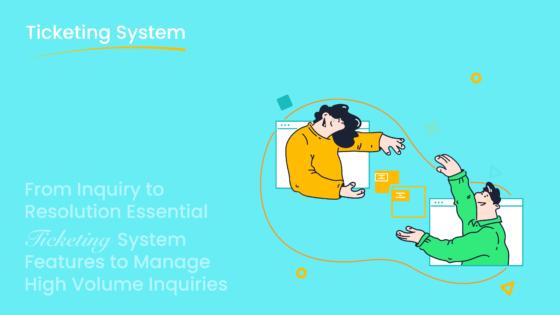
Improved Customer Satisfaction
SaaS customer support tools significantly enhance customer satisfaction by enabling faster and more personalized service. These platforms allow you to provide multichannel support, ensuring customers can reach you through their preferred communication method, whether it’s email, chat, or social media. This accessibility improves the overall experience and builds trust.
The impact of these tools is measurable. Businesses using SaaS solutions have reported a 30% increase in retention rates and a 25% boost in revenue growth.
| Metric | Improvement |
|---|---|
| Retention Rates | 30% increase |
| Revenue Growth | 25% increase |
By addressing customer needs promptly and efficiently, you can foster loyalty and long-term relationships.
Streamlined Ticket Management
Ticket management systems simplify the process of handling customer inquiries. These tools centralize all tickets in one platform, making it easier to track, prioritize, and resolve issues. Automation features, such as ticket routing and SLA reminders, reduce manual effort and ensure no query is overlooked.
Efficiency gains from streamlined ticket management are evident in metrics like reduced ticket backlog and faster resolution times. For example, tracking metrics such as the number of resolved tickets and time to first response helps you measure and improve your team’s performance.
- Customer Satisfaction Score (CSAT)
- Customer Effort Score (CES)
- Net Promoter Score (NPS)
- Ticket backlog
- Number of new tickets
- Number of resolved tickets
- Ticket volume
- Time to first response
- Resolution time
- First contact resolution rate
These metrics highlight how SaaS tools optimize workflows, ensuring your team can handle high volumes of inquiries without compromising quality.
Enhanced Team Collaboration
SaaS customer support platforms promote better collaboration among team members. A unified workspace consolidates customer data, enabling agents to access all relevant information in one place. This eliminates the need for repetitive questioning and ensures consistent responses.
Multichannel support further enhances teamwork by allowing agents to manage inquiries from various channels seamlessly. Features like shared inboxes and internal notes help your team stay aligned, even during complex cases.
By improving communication and providing real-time updates, these tools empower your team to work more efficiently. This leads to faster resolutions and higher customer satisfaction, making SaaS platforms an essential part of modern customer service help desk operations.
Data-Driven Insights for Better Decision-Making
Data-driven insights play a crucial role in improving your customer support strategy. SaaS platforms provide advanced analytics tools that help you monitor and evaluate your team's performance. These tools collect data from every interaction, giving you a clear picture of what works and what needs improvement.
You can use performance insights to track key metrics like response times, resolution rates, and customer satisfaction scores. For example, if your team struggles with long resolution times, the data can highlight bottlenecks in your workflow. This allows you to make informed decisions to optimize your processes. Ticket management systems also provide detailed reports, helping you identify trends and predict future challenges.
Real-time analytics is another valuable feature. It enables you to monitor ongoing activities and adjust your strategy as needed. For instance, if you notice a sudden spike in customer inquiries, you can allocate more resources to handle the increased demand. This ensures your team remains efficient and responsive.
Data-driven tools also help you understand customer behavior. By analyzing patterns, you can anticipate their needs and provide proactive solutions. This not only improves their experience but also builds trust and loyalty. In the competitive world of customer service help desk operations, these insights give you a significant advantage.
Using data effectively transforms your customer support into a well-oiled machine. It empowers you to make smarter decisions, improve efficiency, and deliver exceptional service. With the right tools, you can turn raw data into actionable strategies that drive success.
Choosing the right SaaS customer support software is essential for achieving your business goals. It helps you enhance customer satisfaction, build loyalty, and gain a competitive edge. Satisfied customers often return and recommend your services, creating a solid foundation for long-term growth. By addressing issues promptly, you can reduce churn and retain more customers, which directly impacts profitability. For instance, a 5% increase in retention can boost profits by up to 95%.
Evaluate your business needs and explore the solutions mentioned above. Tools like the Sobot Ticketing System offer automation, multilingual support, and seamless integrations, making them ideal for improving efficiency and customer experience. Start optimizing your customer service today.
FAQ
What is the main purpose of SaaS customer support software?
SaaS customer support software helps you manage customer interactions efficiently. It centralizes communication, automates repetitive tasks, and improves response times. These tools enhance customer satisfaction and streamline your support operations.
How do I choose the best SaaS help desk software for my business?
Start by assessing your business needs. Consider factors like ticket volume, preferred communication channels, and required integrations. Use a help desk software comparison to evaluate features, scalability, and pricing. This ensures you select the right tool for your goals.
Can SaaS help desk software integrate with other tools?
Yes, most SaaS help desk platforms integrate with tools like CRMs, e-commerce platforms, and analytics software. These integrations streamline workflows and improve efficiency by connecting your support system with other business tools.
Is SaaS help desk software suitable for small businesses?
Yes, SaaS help desk software works well for small businesses. It offers affordable pricing, scalability, and features like automation and self-service portals. These tools help you deliver excellent support without requiring a large team.
What are the benefits of automation in help desk software?
Automation reduces manual tasks like ticket routing and SLA management. It improves efficiency, ensures faster responses, and allows your team to focus on complex issues. This leads to better customer satisfaction and streamlined operations.
See Also
2024's Leading Customer Service Software Solutions You Need
Enhance SaaS Customer Support Using Live Chat Techniques
Best Live Chat Assistance Tools to Use in 2024
